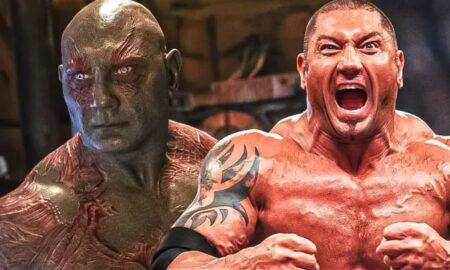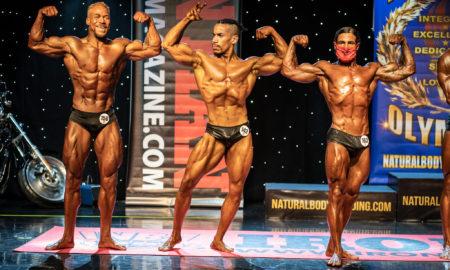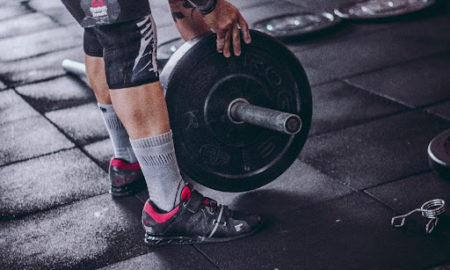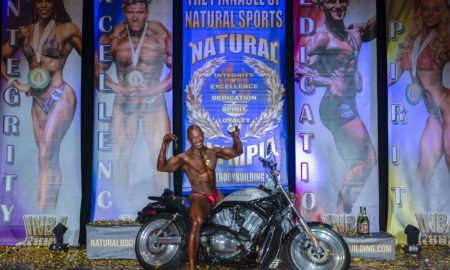Eddie Robinson doesn’t merely enter a room; he commandeers it. Instantly, the atmosphere almost snaps with electricity. All conversation halts, heads slowly turn, jaws invariably drop, and someone whispers, disbelievingly, “Oh, my gawd.”
A somewhat typical scenario for Mr. Robinson, and it isn’t just because of his eternally contest-ready physique. The man himself is charged, and getting too close to this force of nature can result in singed edges and consciousness-blown craniums.
I should know. I’ve interviewed Eddie twice, and, yes, my edges are a bit toasty, but Eddie toned down the dazzle just enough to allow me access.
Now for the question on some readers’ minds: Who is Eddie Robinson?
If you’re a fan of late-’80s and ’90s bodybuilding—and who isn’t?—you already know that Eddie was a big name. Right up there with Mike Christian, Gary Strydom, Jeff King and a slew of other muscle stars. Eddie created static by signing with the ill-fated World Bodybuilding Federation, was welcomed back into the IFBB fold and prospered as a cover boy and official endorser for Joe Weider’s company. While most of his peers faded from the limelight, he enjoyed its warm glow for two decades.
In the crazy arena of bodybuilding, where personalities and careers crash, Eddie Robinson is a survivor.
IRON MAN’s Legends of Bodybuilding series recognizes the accomplishments of bodybuilding pioneers from every era. Eddie’s professional triumphs, his dedication to bodybuilding as a sport, artistic endeavor and lifestyle, and the fact that he’s still outrageously jacked have definitely earned him an honored place among our chosen few.
RL: If you’d gazed into a crystal ball way back when and seen this interview, what would your reaction have been?
ER: Disbelief. Becoming legendary was the last thing on my mind in those days.
RL: Gotta say it—the mantle of legend does fit you well. Like a lifting glove.
ER: Really, I’m not so sure I deserve such an awesome honor. I’m still breathing.
RL: Ha! You don’t have to be dead. We can’t interview ghosts. During the ’80s and ’90s no one epitomized the blending of beefy muscle and clean aesthetic lines better than Eddie Robinson.
ER: I love the way your words just come flowing—like Shakespeare. How can one respond except to smile broadly?
RL: Did you have a specific image in mind back then?
ER: Yes, and I worked toward it with all my heart and soul. The fans liked the effort I was showing, and, in turn, their support made me want to reach my full potential.
RL: The Robinson physique set a supreme standard. I wonder, has your concept been treated with respect since it first blew our minds?
ER: Oh, please, that’s laughable. The 2009 physiques are simply not achievable without massive amounts of drugs, and by no means are they pleasant to my eye.
RL: Is that why you bailed so early?
ER: One reason. I’m not against anabolic drug use in moderation and under strict medical supervision. What irks me is this no-holds-barred attitude to be number one, no matter the physical and psychological toll. Don’t like it now, didn’t like it then.
RL: The fault lies where?
ER: With the judging. The IFBB wants freaks, and competitors must do what it takes to appease them. I never gave that particular devil his due.
RL: What does “making it” mean in today’s bodybuilding vernacular?
ER: It means heavy use of human growth hormone, insulin and all types of ungodly new drugs and techniques, putting athletes in mortal danger.
RL: You’re not blaming the sinner.
ER: No. Their personal priorities might be skewed, but the game is played only one way. They’ve no choice but to follow guidelines set by IFBB judging. Most on the Olympia stage are true champions and would be champions with or without drugs, just not as huge.
It’s all about priorities. I wouldn’t recommend competitive bodybuilding as a good career. You might not have a magnificent physique sitting behind a desk and crunching numbers all day, but you’ll live longer.
RL: Isn’t the showbiz glitz irresistible?
ER: It’s a carrot used to attract those who are naïve.
RL: When did you notice the shift?
ER: Early in my career, about 1980. I used to be classified as one of the biggest bodybuilders, but by 1999, I was a little man onstage. My training and cycle regimen hadn’t changed—only the attitudes. It didn’t take me long to see I wouldn’t be going anywhere with the new way of thinking, so I jumped ship.
RL: Your generation has taken it on the chin for increased chemical dependency. Given that, was it truly a better time?
ER: Aside from the drug issue, our sport was still judged on aesthetics, symmetry and physical perfection. It had very little, if anything, to do with mass. Now, if you don’t look like you’re pregnant, forget about cracking the top 10. Classic bodybuilders have always been known for their wide shoulders and small waists.
RL: But somewhere in the early ’90s, that concept was trashed.
ER: Pursuit of glory, man. Bodybuilders from my era were criticized for their drug usage—certainly the older champs didn’t like what we were doing. Steve Reeves was especially vocal. We deserved the criticism, but at least we appreciated aesthetics; we could do vacuum poses. I doubt any of the national-level dudes can even suck in their gut.
RL: What finally convinced you that things had gone south?
ER: When I saw synthol dripping from a competitor’s shoulder, arms, and triceps, a light suddenly came on and illuminated everything. I no longer belonged in this sport.
RL: And you walked away an iron warrior.
ER: Quitting is against my nature, but if you’re facing a tsunami, you run like hell. I talked to a top IFBB director, and he said get with the program or leave. I didn’t need to be told twice.
Competitive bodybuilding is a business, and bodybuilders are treated like pieces of meat. Nobody cares about your checkbook-balancing skills. As for having opinions, forget it.
RL: You chose the high road.
ER: Always. I’m not what you might call an “in your face” kind of personality, but I only take so much before saying stop. I knew my life, family and health didn’t interest the [powers that be].
RL: I doubt their sentiments have softened over the years.
ER: Are you kidding? Look at how many athletes are standing in the new-kidney line. Mark my words, more sickness and death will come.
RL: Turning back the clock isn’t easy.
ER: No, it’s impossible. Current bodybuilders are in the 260-to-300-pound range onstage. Shawn Ray and I were 215 to 220, max. Massive then, puny now.
RL: And the conclusion?
ER: Fans want to see freaks pushing it to the wall. They’ve been weaned on that stuff. I don’t think much can be done to change the way things are. It’ll take a miracle, literally.
RL: C’mon, you don’t believe in miracles?
ER: Well, this miracle would have to include a complete change of perspective. Only a cataclysmic event will alter the face of competitive bodybuilding in the new millennium.
RL: Couldn’t tell it by lookin’ at you, but your competitive days are supposedly history, huh?
ER: They’re behind me, but bodybuilding’s my love. I’ll never give it up.
RL: What’s your training like now?
ER: I’m in the gym four or five days a week and doing the home gym with my son, Seth, and daughter, Cara. Gotta burn off the chicken wings and beer I missed out on all those years. [Laughs]
RL: Your Weider contract ended in 2002. What have you been up to since?
ER: Lately I have been dedicating most of my time to my distillery, working on my signature line of healthier choice spirits such as my MounTea, which is libido vodka, and Gator Tea—tea-flavored vodkas with added nutrients. Then, after a long day of product development, I’m busy training my children, the two greatest things that have ever happened in my life. You can find us on weekends fishing under the Skyway Bridge from sunup to sundown, enjoying Florida’s brilliant sunshine.
I’m an old musclehead who’s not too set in his ways. Exploring the unexplored and tapping into hidden potential are my thing.
RL: Were you a rough-and-tumble kid?
ER: Rugged as hell. I’d go through a can of Copenhagen a week and never shied away from a good fight.
RL: You grew up where?
ER: In the projects of Akron, Ohio. Not the best neighborhood, but I had a blast. Every day was a new adventure. If you have an imagination, you can deal with almost any situation. That’s the beauty of being young.
RL: Sports. Love ’em or leave ’em?
ER: Love ’em! There were neighborhood games going on everywhere. Baseball, soccer, kickball, whatever we could think up on the spot. I love football and played up through high school. Boxed golden gloves, too, for three years.
RL: It was important to be strong?
ER: Very important. In high school the football players put on an annual bench day, and it drew me like a magnet. I’ve always enjoyed being physical.
RL: And you got to wear their 400-club shirt.
ER: The only freshman who did. I wore it proudly, like a badge of honor.
RL: You’ve said that powerlifting is your sport, that it’s what you were born to do. Is that right?
ER: Yep. Took to it instantly. Just me and the iron, element against element. Who would win? Who would lose? I’m still quite passionate about it.
RL: But when people think of Eddie Robinson, they don’t picture a powerlifter.
ER: Obviously, God had other plans in mind for this boy. Bodybuilding didn’t interest me at all—but plenty of people told me I had a bodybuilder’s physique.
RL: What made you finally switch?
ER: Economics. I wanted to make a living in sports, but I knew it wouldn’t be powerlifting. One day Joe Weider called after he’d heard of my teen world records and said I needed to jump onstage and show off my physique.
RL: Sound advice from the Master Blaster. How old were you then?
ER: I was 17, which is pretty young. Still, I’d set a teen world record at 510 pounds in the 220-pound class and had broken another world record at 575 and 610 pounds in the 220 class. That ranked me number one in the world. What else was left for me to do? I started shopping for a pair of posing briefs.
RL: Bodybuilding is like powerlifting’s black sheep cousin. Traditionalists consider it little more than a beauty pageant, lacking in athletic merit.
ER: It takes a special kind of athlete to be a powerlifter. You’re pushing beyond the limit. Bodybuilders lift for looks and size; it’s not for strength.
RL: You held to the traditionalist viewpoint, I presume?
ER: I won’t sugarcoat it. Yes, my feelings were identical. That’s why I did both—but bodybuilding eventually won out.
RL: What closed the door on powerlifting?
ER: A trip to Venice [California] in 1984, where I shot my first cover and photo spread with Chris Lund.
RL: Why Venice?
ER: It came about because Ed Connors, who was then running a Gold’s Gym, invited me. I had stars in my eyes. Ed introduced me to a few big names of the day, including Tom Platz and Arnold. Pretty heady stuff. I even trained with Arnold at the Venice World Gym, and we’d eat breakfast together at the Rose Cafe.
RL: You arrived during the mid-’80s, when mass monsters were still unusual. Your physique straddled the line between aesthetics and mass.
ER: That’s because of my power-lifting background. My arms and shoulders were overdeveloped from years of heavy pressing, and once I concentrated on bringing up other bodyparts and lightening the weight, everything balanced out beautifully. Ain’t much else to tell. I went from powerlifting and all the muscle it built and then became a bodybuilder.
RL: Did you dig the exposure?
ER: I thank God for everything He bestowed on me during my professional career. And I must give Joe his props. Mr. Weider loved to keep me in front of the camera.
Joe believed in me and kept me working. All he ever asked was that I get in shape using Weider nutritional products and do a couple of photo shoots a year. Of course, I gladly complied. Those were 12 wonderful years.
RL: As you know, Ben Weider recently passed away. Your feelings?
ER: Ben and I were close; he would often call me and ask how I felt about the future of bodybuilding. He was a good soul, dedicated to the IFBB, and is profoundly missed.
RL: And competitive bodybuilding is at a crossroads. How’s the future look?
ER: Very dim. Product companies aren’t endorsing athletes like they used to; we’re not respected or in demand for appearances. Some athletes are facing severe health issues, and we no longer have physiques that are achievable without the extreme abuse of every enhancement hormone known to mankind.
RL: But you weren’t a natural competitor.
ER: I’m not saying I was pure, nor am I against the use of performance-enhancement products; however, to answer your question, as for competing natural, yes, I competed in the 1990 Olympia clean and four years with the WBF [clean], for which I have all the drug tests. My complaint is this: We’re dealing with harsher products today, like mannitol to get dry, synthol to blow up lagging bodyparts, human growth hormone, insulin and grossly abused anabolics that are mostly counterfeit, being made in someone’s kitchen.
RL: You’ve drawn a personal line in the sand?
ER: I took one look at my beautiful daughter and son, my family and life itself and swore that I would not risk one second of one minute of one day playing the dead man walking game.
RL: Let’s backtrack and peek inside Pandora’s box—what about the WBF?
ER: No, no, it ain’t no Pandora’s box. The WBF was ahead of its time, and I miss working with Mr. [Vince] McMahon. For a while he had the IFBB soiling their undies.
RL: Yet the WBF imploded.
ER: Not every innovation catches fire. Vince could’ve elevated bodybuilding above and beyond anything we’d ever seen. He displayed our physiques like works of art, and we were treated and admired as pro athletes.
RL: After the WBF collapsed, Joe Weider rolled out his red carpet for you. Was there any flak from on high?
ER: Oh, a little grumbling, yeah…but Joe oversaw publications and nutrition, and what Joe wanted, he got. He offered me an incredible contract, and I followed through on my end.
I was lucky, and I knew it. Most of the other guys who’d defected to McMahon’s maverick group fell off the radar. My Weider contract not only gave me primo exposure on covers and in ads, the doors that were opened stayed open.
RL: Maintaining a top physique helps—and the Robinson superstructure has to be seen to be believed.
ER: You’re seein’. Are you believin’?
RL: That I am, big guy.
ER: All right. [Laughs] I’m in control of my body and know what look is good for me. Though I haven’t competed in ages, I’m still rock solid.
RL: Reflecting on your career, what was the high point?
ER: Spending years with Joe Weider and Vince McMahon. I miss the conversations Joe and I had; he always made the hair on my arms stand up straight. Second highest point of my career is the support from my friend Donald Trump, who was backstage giving me pointers during the WBF days.
RL: And the lowest point?
ER: Seeing bodybuilding deteriorate into a freak show, watching Joe lose control of the sport he built and its direction, along with hearing people talk smack about him when he made them what they are today.
RL: You mentioned your line of spirits, including a tea-flavored vodka with a libido kick. What is that, exactly?
ER: I have developed a healthier choice of spirits for athletes and weekend warriors who need to be at the top of their game after a night out on the town. In 2008 I met up with a great man named Henry Kasprow, whose family tradition is manufacturing some of the finest spirits in the world without the use of harsh chemicals. I have joined Henry and his family to introduce a healthier choice of spirits.
Let’s face it: Some of us athletes like to have a cocktail here and there. We play hard and also party hard, which is well deserved, and we can all do without the brutal hangover or toxic results that come from drinking the majority of cheap manufactured spirits found in the marketplace and bars. As athletes we need to be at the top of our game the next day, not in bed dehydrated with an ice pack on our head. My vodka products are manufactured without the use of chemicals, handcrafted in copper pot stills and then distilled six times, making the vodka pure and clean. My MounTea Libido products and Gator Tea line are not only the cleanest of spirits but the vodka also has added libido enhancer and other raw ingredients to offset secretion of vitamins and the decrease in hormonal functions due to alcohol.
RL: What’s your secret to success?
ER: Keep your dreams alive. Understand to achieve anything requires faith and belief in yourself, vision, hard work, determination and dedication. Remember, “all things are possible for those who believe” (Phil. 4:13).
Every day you’re alive is a special occasion. Every minute, every breath, is a gift from God. As athletes our actions inspire others to dream more, learn more, do more and become more. We are leaders, red, white and blue to the bone. As eagles we fly together. And eagles do not play with chickens.
RL: Well, sir, now that you’re officially an IRON MAN Legend of Bodybuilding, has the honor changed you?
EDDIE: Has it! I’m wearing shades and refusing to sign autographs. [Grins] Actually, and in all seriousness, being named an IRON MAN legend is a kick. I’m blessed that I was able to touch lives and am remembered as one of the world’s best.
Editor’s note: Check out Eddie Robinson’s Web site, www.EddieRobinson.org. Also, he says, “Come and visit me on my Facebook fan page, where I have posted all my 75-plus covers and 360 training articles, along with numerous training and family pics. Search Eddie Robinson IFBB Pro.” IM
Eddie Robinson’s Competitve Record
1982: NPC All South Championships, Teen Short, 2nd
1983: NPC Florida Championships, Teen Middleweight, 3rd / NPC Southern USA, Middleweight, 3rd
1984: AAU Mr. Florida, Teen, 1st /NPC Teen USA Championships, Light heavyweight, 1st and Overall
1986: NPC Junior Nationals, Light Heavyweight, 1st and Overall
1988: NPC Nationals, Heavyweight, 5th
1989: NPC USA Championships, Light Heavyweight, 1st, and Overall
1990: IFBB Niagara Falls Pro Invitational, Winner / IFBB Night of Champions, 7th / IFBB Mr. Olympia, 10th
1991: WBF Grand Prix, 5th
1995: IFBB Grand Prix France, 8th / IFBB Grand Prix Ukraine, 8th / IFBB Night of Champions, 8th
1996: IFBB Canada Pro Cup, 5th / IFBB Florida Pro Invitational, 4th / IFBB Night of Champions, 9th
1997: IFBB Arnold Classic, 13th / IFBB IRON MAN Pro Invitational, 7th
1998: IFBB San Francisco Pro Invitational, 13th / IFBB Toronto Pro Invitational, 11th
1999: IFBB Toronto Pro Invitational, 8th
Eddie Robinson’s Current Workout
Monday: Abdominals, Chest, Triceps
Crunches 4 x 25-30
Hanging leg raises 4 x 25-30
Standing bent-over twists 2 x 50
Bench presses (warmup) 1 x 15
Superset
Bench presses 4 x 10, 8, 8, 6
Flyes 4 x 10, 8, 8, 6
Incline presses 4 x 10, 8, 8, 6
Incline flyes 4 x 10, 8, 8, 6
Decline-bench presses 4 x 10, 8, 8, 6
Decline flyes 4 x 10, 8, 8, 6
Machine flyes 2 x 15-20
Dips 5 x 10
Pushdowns 4 x 8-10
Rope extensions 4 x 8-10
Skull crushers 3 x 10-12Tuesday: Abdominals, Back, Biceps
Crunches 4 x 25-30
Hanging leg raises 4 x 25-30
Standing bent-over twists 2 x 50
Deadlifts (warmup) 1 x 15
Superset
Deadlifts 4 x 10, 8, 8, 6
Cable rows 4 x 10, 8, 8, 6
Front pulldowns 4 x 10, 8, 8, 6
T-bar rows 4 x 10, 8, 8, 6
T-bar rows (negatives) 4 x 10
Wide-grip preacher curls 3 x 10, 8, 8
Close-grip preacher curls 3 x 10, 8, 8
Incline curls 3 x 10, 8, 8
Concentration curls 2 x 10-12Wednesday: Off
Thursday: Abdominals, Quads, Hamstrings
Crunches 4 x 25-30
Hanging leg raises 4 x 25-30
Standing bent-over twists 2 x 50
Squats (warmup) 1 x 15
Squats 5 x 10, 8, 8, 6, 6
Leg presses 4 x 10, 8, 8, 6
Leg extensions 5 x 10, 8, 8, 6, 6
Leg curls 5 x 8, 8, 6, 6, 4
Barbell lunges 4 x 8, 8, 6, 6Friday: Abdominals, Shoulders, Calves
Crunches 4 x 25-30
Hanging leg raises 4 x 25-30
Standing bent-over twists 2 x 50
Military presses (warmup) 1 x 15
Military presses 4 x 10, 8, 8, 6
Barbell upright rows 4 x 10, 8, 8, 6
Lateral raises 4 x 10, 8, 8, 6
Seated bent-over lateral raises 3 x 10, 8, 8
Standing calf raises (warmup) 1 x 15
Standing calf raises (toes in) 3 x 10
Standing calf raises (toes out) 3 x 10
Seated calf raises 3 x 10, 8, 8Saturday and Sunday: Off
Note: He does 45 to 60 minutes of some type of cardio before every workout.
















You must be logged in to post a comment Login